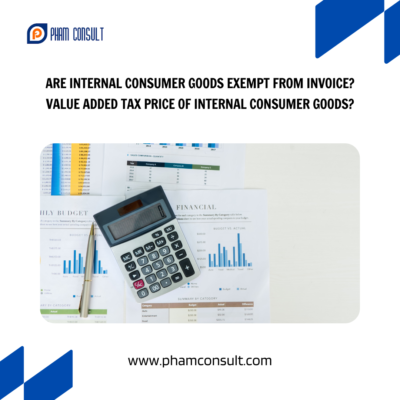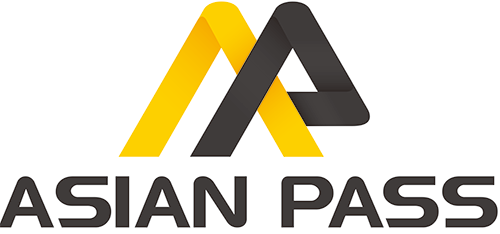Are internal consumables exempt from invoice issuance? How is the value-added tax calculation price for internal consumption goods determined? How is the time for determining value added tax determined? Through today’s article, let’s learn about this issue with Pham Consult!

Are internal consumables exempt from invoice issuance?
Pursuant to Clause 1, Article 4 of Decree 123/2020/ND-CP stipulating the principles of creation, management and use of invoices and documents as follows:
Principles for creating, managing and using invoices and documents
1. When selling goods or providing services, the seller must issue an invoice to deliver to the buyer (including cases of goods and services used for promotion, advertising, sample goods, goods and services). services used to give, donate, exchange, pay on behalf of employees and for internal consumption (except for goods circulated internally to continue the production process); exporting goods in the form of loans , loan or return of goods) and must fully record the content as prescribed in Article 10 of this Decree. In case of using electronic invoices, it must follow the tax authority’s standard data format as prescribed in Article 12 of this Decree.
…
According to this regulation, when selling goods or providing services, the seller must issue an invoice to deliver to the buyer, including cases where the goods and services are for internal consumption.
However, the above regulations also exclude cases where goods are transferred internally to continue the production process, and invoices are not required.
Thus, it can be seen that internal consumption goods do not have to be invoiced only in cases where goods are circulated internally to continue the production process. For other cases, invoices must be issued according to regulations.
How is the value-added tax price of internal consumption goods determined?
The value-added tax calculation price of internal consumption goods is specified in Clause 4, Article 7, Circular 219/2013/TT-BTC (amended by Clause 2, Article 3, Circular 119/2014/TT-BTC) as follows :
Taxable price
…
4. Taxable prices for products, goods and services for internal consumption.
Internally circulated goods such as goods exported for internal warehouse transfer, export of materials, semi-finished products, to continue the production process in a production or business establishment or goods and services provided by the establishment Export or supply business used to serve business activities is not required to calculate and pay VAT.
In case a business establishment produces and constructs fixed assets by itself (self-made fixed assets) to serve the production and business of goods and services subject to VAT, upon completion, acceptance and handover. , business establishments do not have to issue invoices. Input VAT forming self-made fixed assets is declared and deducted according to regulations.
In case of exporting machinery, equipment, supplies and goods in the form of loan, loan or refund, if there is a contract and appropriate documents related to the transaction, the business establishment does not have to invoice. Apply, calculate and pay VAT.
…
Particularly for business establishments that use goods and services for internal consumption or internal circulation to serve production and business such as transportation, aviation, railways, post and telecommunications, VAT is not required. output, business establishments must have documents clearly defining the subjects and levels of control of goods and services for internal use according to prescribed authority.
Accordingly, for internally circulated goods such as: goods exported for internal warehouse transfer, supplies, semi-finished products, to continue the production process in a production or business establishment or goods , services exported or supplied by business establishments used to serve business activities are not required to calculate and pay value added tax.
Thus, according to this regulation, internal consumption goods in the above cases do not have to pay value added tax. Therefore, there is no need to determine the value-added tax price for internal consumption goods.
How is the time for determining value added tax determined?
According to the provisions of Article 8 of Circular 219/2013/TT-BTC, the time for determining value added tax is specifically guided as follows:
– For the sale of goods, it is the moment of transfer of ownership or rights to use the goods to the buyer, regardless of whether money has been collected or not.
– For service provision, it is the time of completing the service provision or the time of issuing the service provision invoice, regardless of whether money has been collected or not.
For telecommunications services, it is the time to complete the comparison of data on telecommunications connection service charges according to economic contracts between telecommunications service businesses, but no later than 2 months from the month of issuance. generate fees for telecommunications connection services.
– For electricity and clean water supply activities, the date the electricity and water consumption index is recorded on the meter to record on the bill.
– For real estate business, infrastructure construction, house construction for sale, transfer or lease, the time of payment is collected according to project implementation progress or payment collection schedule stated in the contract. . Based on the amount collected, the business establishment declares output VAT arising during the period.
– For construction and installation, including shipbuilding, it is the time of acceptance and handover of the project, project items, completed construction and installation volume, regardless of whether money has been collected or not. get money.
– For imported goods, it is the time of customs declaration registration.
– For construction and installation, including shipbuilding, it is the time of acceptance and handover of the project, project items, completed construction and installation volume, regardless of whether money has been collected or not. get money.
– For imported goods, it is the time of customs declaration registration.
Comments




 VI
VI